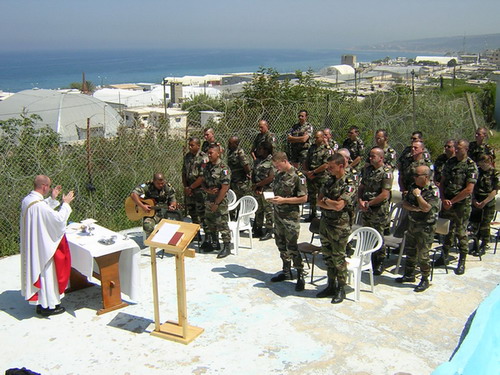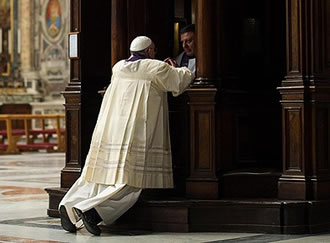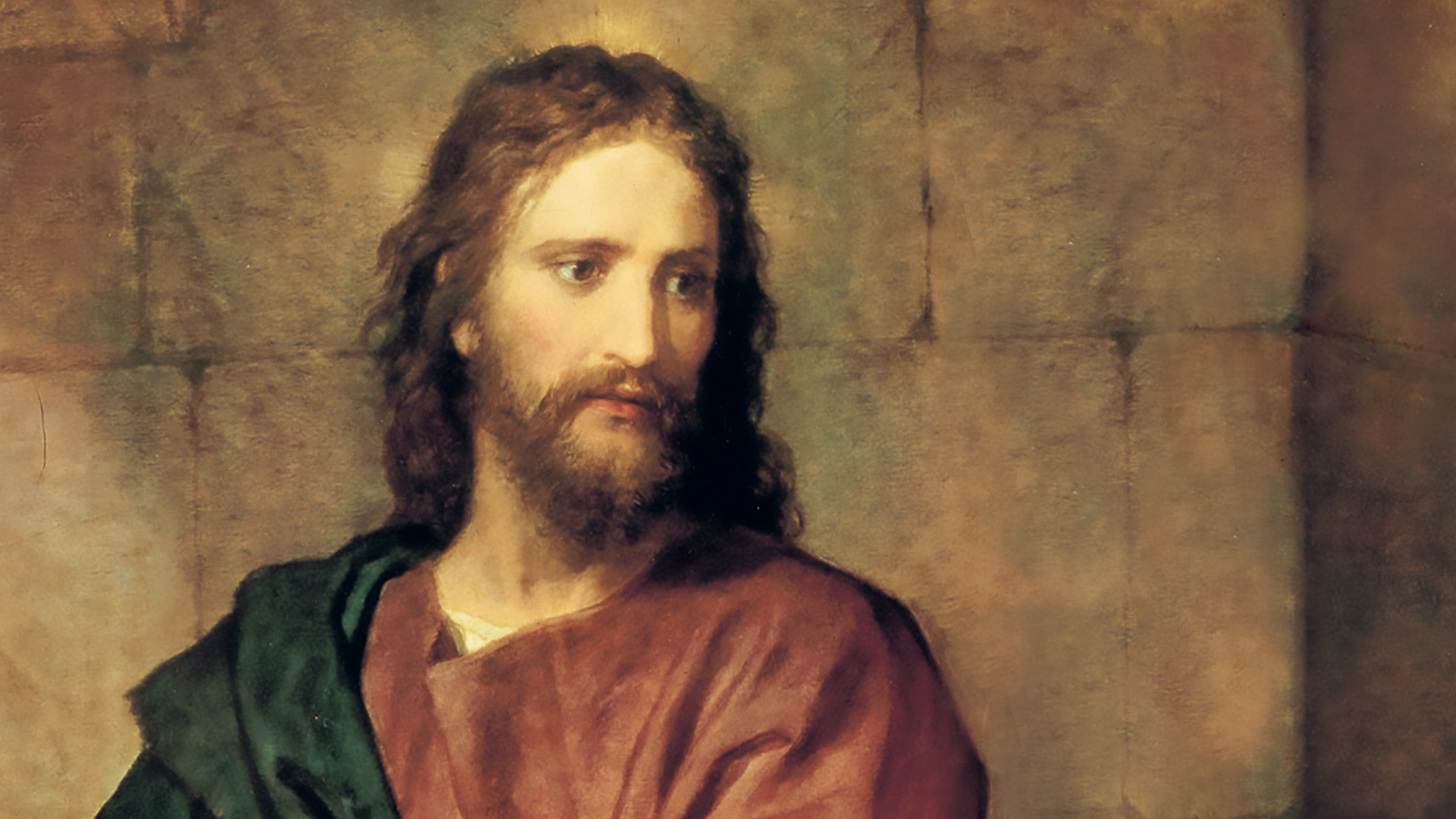Living or Just Surviving (as a Catholic): Part I
I’m sure you have heard motivational speakers talk about the difference between “merely surviving” and “truly living.” The idea is that mere survival means you are just getting along, coasting through life, not really contributing or getting anything out of it. Whereas if you are truly living you are seizing the day, getting the most out of every moment, absorbing and appreciating all the good things around you.
Of course we all want to be fully living, not merely surviving. But when it comes to our faith, how often do we take the time to ask ourselves if we are truly living as Catholic Christians, or just surviving?
If you have not seen them yet, we have these wonderful little prayer books available at CCM called the Handbook of Prayers. If you don’t have one, pick one up next time you come by (they are free to students). This book has loads of great Catholic prayers, as well as a lot of good general information about the Catholic faith. One of the things it has is a list of the Precepts of the Church. A lot of Catholic prayer books have this list somewhere toward the front. The idea behind the Precepts is that these are the minimum obligations of a Catholic; the things you ought to be doing to remain a Catholic in good standing. I call it the “Bare Minimum List.” There are only five things on this bare minimum list. Here they are.
- “You shall attend Mass on Sundays and on holy days of obligation and rest from servile labor.”
- “You shall confess your sins at least once a year.”
- “You shall receive the Sacrament of the Eucharist at least during the Easter season.”
- “You shall observe the days of fasting and abstinence established by the Church.”
- “You shall help to provide for the needs of the Church.”
That’s a pretty simple list, and you may be reading it thinking, “I do all those things and more.” Good for you. But you may be thinking, “Wow, I didn’t know I was supposed to be doing that.” And you would not be alone. Nevertheless, these are the things considered so vitally important by the Church as to be tied by obligation to our very identity as Catholics. So let’s talk about what these obligations entail and why they are important.
You shall attend Mass on Sundays and on holy days of obligation and rest from servile labor.
One thing to be mindful of is that these obligations are serious but not absolute. Sunday Mass attendance is a good example. There are (a few) legitimate reasons to miss Mass on Sunday. If you are sick, no one expects you to come spread your germs among the congregation. Likewise if you are taking care of someone who is sick, and cannot leave their side to attend Mass. Or if you physically cannot get to a Catholic church; for example, if you are a scientist stationed at an Antarctic research facility for six months, or if you get snowed in at home during the winter.
All that being said, Mass attendance is a serious obligation which can only be dispensed with for serious reasons. Being on vacation does not mean a vacation from Mass. Just because you are away from your home parish does not mean you are not obligated to attend Mass somewhere. It is expected that any time you travel you would check to see when and where Sunday Mass would be celebrated near you.

don’t even have a church building but are still fulfilling
their duty to worship at Sunday Mass.
If you are uncertain whether a particular reason for missing Mass is serious enough to lift the obligation, there is a simple question you can ask yourself. Do I want to attend Mass, but cannot? Or do I not really want to attend Mass, and am looking for an excuse not to? If you desire to attend Mass but genuinely are unable to, then your reason for not attending is probably legitimate. But let’s not kid ourselves. Most people, in most places, have multiple opportunities to attend Sunday Mass. Even in our small town we have a Saturday night Vigil Mass and two Sunday morning Masses at St. Mary’s, followed by a Sunday afternoon Mass on campus. That’s four different opportunities without even having to drive to the next town over.
Why is attending Mass so important? The reasons are many and varied, but suffice it to say, everything we have is from God. It is only right that we pause for at least a short time in our busy lives to recognize Him and give Him thanks. We have 168 hours during the week. Mass takes up one of them. If we cannot give God even that, how committed are we to our faith?
God also gives us the gift of sabbath, a day of rest. He did not make us to live lives of servile labor. By commanding us to rest on Sunday, He gives us a chance to be fully human and reconnect with what is truly important. Let’s not turn down this gift.
And lest we forget, holy days of obligation are days of the year outside of Sunday that are important enough celebrations in the Church that they carry the same obligation to attend Mass as a Sunday. Click here for a list of what those days are. They are called holy days of obligation, not holy days of “come to Mass if you want to and it’s not too inconvenient.” The requirement to attend Mass on holy days of obligation also means that you should be at least minimally aware of the Church’s liturgical calendar, so that these important feasts don’t catch you off guard (however, if you attend Mass every Sunday, you’ll no doubt hear a reminder of upcoming holy days from the pulpit).
Out of all five precepts on this “bare minimum list,” the obligation to attend Mass is listed first for a reason. If you do nothing else as a Catholic, you need to be attending Mass on Sundays. To fail in this obligation is to live a life outside of the Church.
You shall confess your sins at least once a year.

Confession is important. It’s the way God established in His Church to convey His forgiveness to us and allow for our reconciliation to Him when we have fallen. When we turn away from Him in sin, He invites us to turn back to Him (repent means to turn around) in this sacrament.
By requiring us to confess our sins at least once a year, the Church simply recognizes reality. We are sinners. In countless ways we fall short of the perfect love of God. If it has been more than a year since your last confession, I guarantee you it is not because you are sinless. Either you don’t recognize your sins, or you are running away from God’s mercy. Either of those is foolish. By requiring us to confess our sins at least once a year, the Church is keeping us honest with ourselves. You need Confession. If it’s been a while, the good news is all you have to do is come back. Just walk into the confessional and say, “Forgive me father, it has been X years since my last confession.” The priest and the Holy Spirit will guide you from there.
The requirement to confess our sins at least once a year is also there to allow us to keep the next obligation, which is…
You shall receive the Sacrament of the Eucharist at least during the Easter season.
The Eucharist is the “source and summit of our faith” (Sacrosanctum Concilium). It completes our initiation into the Christian life. It is a gift from God that we are not meant to receive only once but over and over again to sustain us — give us this day our daily bread.
This particular precept may seem strange to modern day Catholics who are used to receiving the Eucharist every time we are at Mass, but frequent reception of the Eucharist used to be much less common. It is necessary before receiving the Eucharist to examine one’s conscience to make sure one is not guilty of mortal sin. Otherwise, sacramental confession is first required to ensure that one receives the Eucharist in a state of grace. In order to grow in love of God and neighbor, the Church has established as a minimum that we should receive the Body and Blood of our Lord at least during the Easter season, which is the high point of the liturgical year.
You shall observe the days of fasting and abstinence established by the Church.
Rules on fasting and abstinence have never been less strict than they are at the present time in the Church. However, one consequence of them being so light is that people sometimes forget that they are serious obligations. As a reminder, Catholics between the ages of 18 and 59 are obliged to fast only two days per year: Ash Wednesday and Good Friday (that obligation is lifted for those who are ill). On fasting days you are permitted to take up to two small meals (snacks) that together do not equal one whole meal. Catholics are also required to fast for one hour before reception of the Eucharist. Water and medicine do not break the fast.
Catholics over the age of 14 are obliged to abstain from meat on Ash Wednesday and all Fridays during Lent. An often overlooked fact is that all Fridays during the year are days of penance, with the general obligation to abstain from meat. In the US (and other parts of the world) the bishops have allowed for the faithful to substitute some other form of penance in place of abstaining from meat on Fridays outside of Lent. But every Friday is still a day of penance, in honor of our Lord’s passion, just as every Sunday is a day of joy in honor of our Lord’s resurrection.
Of course, fasting in the Church is not merely about not eating food. It’s about discipline, penance and prayer. As we fast we should be praying for ourselves and for others and remembering what God suffered out of love for us.
You shall help to provide for the needs of the Church.
This means you are expected to contribute to the Church according to your own ability. This includes making a weekly offering in the collection basket, but is not limited to that. If you cannot contribute financially to the Church, consider contributing time or talent. Join the choir. Volunteer to mow the lawn. Sweep the floors. There are all sorts of needs you can help to address. When it comes to financial offerings, the Church does not mandate a certain percentage of your income. The idea of tithing 10% is biblical (from the Old Testament; cf. Lev 27:30-33, Num 18:21-28, Deut 26:12-13) and is certainly a fine thing to do. But the Church only requires that as a member of the Church you assist somehow in providing for the Church’s needs. The Church leaves it to your prudential judgment to determine how you can best contribute.
That’s the “Bare Minimum List.” Go to Mass. Go to Confession. Receive the Eucharist. Fast when the Church tells us we ought to fast. And help provide for the needs of the Church.
The Precepts of the Church are not my list. Nor is it a list of helpful suggestions. This is the bare minimum list given to us by the Church herself of what we need to do to “survive,” as it were, as faithful Catholics.
But is mere survival all we are after? Is it enough as a Christian to just “get along” in our faith? The Church has such a rich treasury of grace at her disposal and she gives of it so freely, it would be foolish not to take advantage of all she has to offer.
The same prayer book I spoke of at the top of this article also has a section entitled, “How to be a Better Catholic.” In it you will find wonderful advice on some pretty basic things you can be doing to get the most out of your Catholic faith. It’s the difference between just surviving and truly living.
If you are ready to move beyond the “Bare Minimum List” of survival as a Catholic and really start to live your faith to the fullest, click on to Part II of this article.



